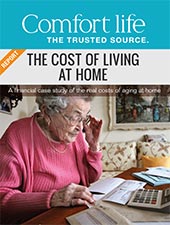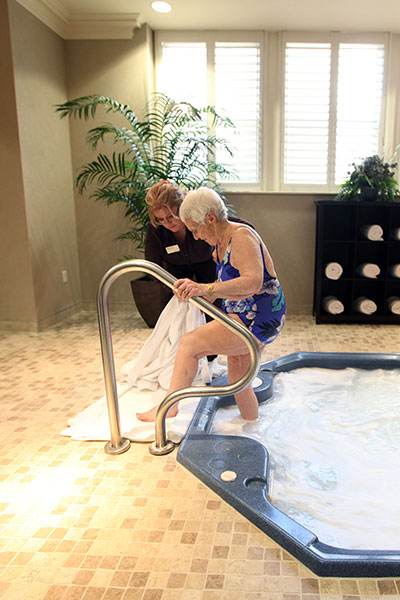Government-supported home care is available in all jurisdictions across Canada, with some limitations. Home visits by nurses, physiotherapists, occupational therapists and social workers are typically available to cover an acute short-term need. This care may be available on a less frequent basis for those with longer-term chronic health conditions. It is assumed that family will still provide care and the publicly funded system supports this care. Anyone can request an assessment for eligibility from the government. When a senior requires more daily care and household operations a live-in caregiver can be hired through Human Resources and Skills Development Canada (HRSDC)'s Live-in Caregiver Program. Bear in mind, that regulation of home care workers is scattered (read more).
Be sure that you are taking advantage of all the free and subsidized home health care services available through your provincial government, other government services and local charities. There are many other services that are not free or may require your name on a waiting list, or other considerations. Some tasks you may be able to find help with include lawn and snow care, meal preparation or home cleaning. There are a variety of home care services provided by local communities and funded by a number of government levels and non-profits like the United Way.
Government-funded home care assistance offered in some jurisdictions may include the following:
- Household maintenance like laundry, shopping, gardening, housekeeping, and handyman services.
- Transportation to and from appointments and programs
- Subsidies for home modifications like grab bars in the shower, ramps to avoid or minimize the use of stairs, or even installing new bathrooms on the ground floor
- Personal care like dressing, bathing, feeding, or meal preparation.
- Day programs that address isolation and need for socialization during the day, while providing a break for caregivers. These are closely related to the home care services industry in many provinces. Some day programs are primarily social, while others provide limited health services or specialize in disorders such as early stage Alzheimer’s. Read more below about day programs for adults.
You can learn more about these home care solutions and find government contacts in our senior care advisor, under Support Services.
Many of these community services rely on charitable donations in order to keep going and government funding of programs is always subject to change, as well.
As is widely reported, demand for home care frequently outpaces government resources available, and organisations like the Local Health Integration Network are forced to restrict the hours of care provided per week or to place patients on waiting lists for care services.
Privately funded home health care providers are a perfect way to augment community-funded services. These companies come into the home and provide elderly community members with tactical help in areas that may not be covered by other services listed above. These companies offer outside help solutions for seniors that are accountable and professionally handled and are customized directly the individual senior’s needs. Services include regular companionship and visits that may include help with shopping and errands and even Alzheimer's Care, as well as dependable, reliable care in areas such as housekeeping, meal preparation and transportation.
These companies can also be used by people living in a retirement home who want to extend services they receive. Consult with the companies listed here to learn more about what they offer.
An Overview
Government-funded home care services are staffed with caring, professionally trained people. The volunteer-based Ontario Community Support Association provides essential-care services to 750,000 Ontarians yearly, and their community support services benefit those with chronic-care needs at half the cost of care in other facilities (the estimated value of this volunteer labour to the Canadian economy as early as 2003 was in the range of $20 to $30 billion). However, many people in both the private and public health care sectors admit that inconsistent funding undermines care provided. Government-funded services may also be subject to income testing and/or a co-pay depending on the jurisdiction, and there may be a variety of reasons for limits as to the amount of service that can be provided. Home care service providers are often contracted privately to deliver the additional hours that support and complement the publicly funded care. Even when there is strong family support close by, it can be extremely helpful to have a home care provider assisting with the caregiving responsibilities.
Private service providers offer a fuller suite of services, more accountability and a stronger guarantee of dedication when it comes to any form of senior care. For example, when it comes to long-term care homes, there are often waiting lists to get into the best care homes, and wait times to find the proper care can be one, two years, and even longer. Hiring a reputable, professional in-home care is one way of guaranteeing proper care for loved ones. As reported in Comfort Life as early as 2003, the 80-plus demographic is "the fastest-growing segment of the country's population" and is now well over 1 million people. As we reported then, government home-care spending has not kept up with the increase in population, holding steady at only four per cent of Ontario's health-care budget. In addition, only about 15 to 20 per cent of Ontario's health care funding goes to chronic geriatric home care. All of this means that the private home health care sector may be a safer bet, whose benefits you may need to consider.

Caution against hiring private individuals
A survey of Canadian families in 2010 showed that more than half of respondents (65%) were unaware of the risks inherent in directly hiring a non-professional, non-certified, non-accredited individual to provide private home care. Some families hire personal care for an elderly family member, based on a personal job interview and a few references. Senior home care is difficult, challenging work and under many circumstances should never be undertaken by any untrained, unqualified people (this also includes family members, as well).
Accredited home care organizations that belong to an association such as the OHCA have a number of measures in place to ensure quality and professionalism.
These include:
- Selective recruitment. Some organizations claim a hiring rate as low as 8%: 1 in 15 PSWs who apply end up getting hired. This comes from an understanding that this is often stressful, demanding work and is not suited to everyone.
- Supervision and accountability. Organizations with a chain of command encourage responsibility and internal discipline that helps ensure the quality of care given. In addition, there are occupational hazards that include the potential for injury (for example, due to lifting and other caregiving tasks). The Liability Coverage offered by professional organisations ensures that your caregiver will be safeguarded, and should something happen, other workers will be ready to step in and continue caring for your loved one.
- Ongoing education. Many care workers are required to upgrade skills and training on at least a yearly basis.
- Labour practice accountability. When workers are compensated fairly, they feel greater accountability to do an excellent job of caring.
- Care coordination. Professional home care services are better situated to respond to changing needs with flexibility and timeliness. For example, if a senior has bouts of incontinence, these are handled in the most professional and proper manner conceivable.
Even when hiring a professional caregiver, there are questions that will help you find the right care for your family and loved one.





